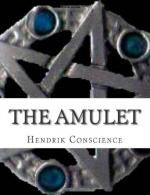Geronimo, the watchmen, and Julio soon reached the residence of Mr. Van de Werve. He knocked, and was immediately admitted.
The young gentleman again thanked Julio with the liveliest gratitude for his assistance, and promised to tell his master how courageously he had acted, and the eminent services he had rendered him.
Julio bade adieu, and hastened to his master’s dwelling. He was about to knock, but, to his great terror, the door was opened at once, as though some one were waiting for him.
“Is it you, Julio?” asked a man, in the darkness.
The servant recognized his master’s voice, and entered the door.
“Well,” said he, in a stifled tone, “is he dead?”
“Who?”
“Who! Geronimo?”
“On the contrary, Bufferio is dead. Geronimo ran him through the body.”
“Then you have not the pocket-book?”
“Certainly not.”
“And the gold crowns?”
“I gave them to Bufferio.”
“Pietro Mostajo, you have betrayed me!” hissed the infuriated signor in the ear of his servant, shaking him convulsively by the arm. “Tell me quickly what has happened! Tremble, stupid coward! the Superintendent of Lucca shall know who you are!”
“Ebbene che sia!” answered Julio. “Then the Signor Geronimo shall also know who hired Bufferio to assassinate him.”
A hoarse cry like a stifled groan resounded through the vestibule. The door was closed.
CHAPTER V.
VAN DE WERVE’S RECEPTION—SIMON TURCHI’S JEALOUSY AND HATRED.
Mr. Van de Werve, whose large fortune justified a lavish expenditure, was accustomed to receive at his residence every month the principal gentlemen of Antwerp, strangers as well as citizens. His love for art and science induced him to bring together the best artists and the most noted literary men of the day with the high-born, wealthy, and influential members of society at Antwerp; and his house had become the rendezvous of all that was excellent and celebrated in the city.
Nearly the whole of the anterior part of the house was occupied by a vast hall, called the Ancestral Hall, because it was decorated by numberless souvenirs of his illustrious family. The walls, for a certain distance were sculptured in oak wood, so artistically designed, and so delicately wrought, that at the first glance it looked like embroidery in various colors. To produce this effect, the natural brown of the oak had been left in some places. All the rest shone with gold and silver, which was relieved by a beautiful scarlet, brilliant yellow, and the softest sky-blue. The many small figures scattered over the ornaments were highly gilded. From the wooden wainscot arose slight pillars, which, uniting in the Gothic style, supported the heavy beams of the ceiling. Six of these beams were visible: all were covered with highly colored sculptures. Their decorations harmonized with, those of the wainscot, and seemed an expansion of it, as though the architect wished the exquisite ornaments of the beams of the ceiling to be considered a luxuriant verdure, springing from trunks rooted in the oaken wainscot.




